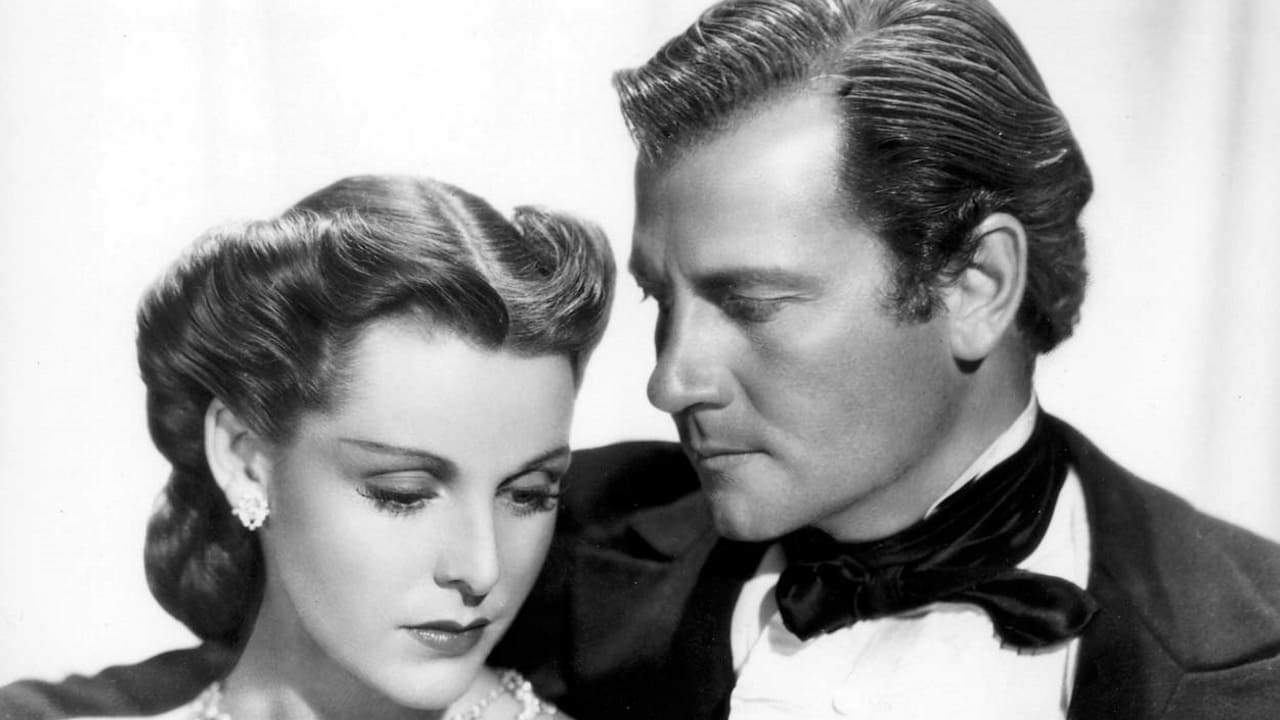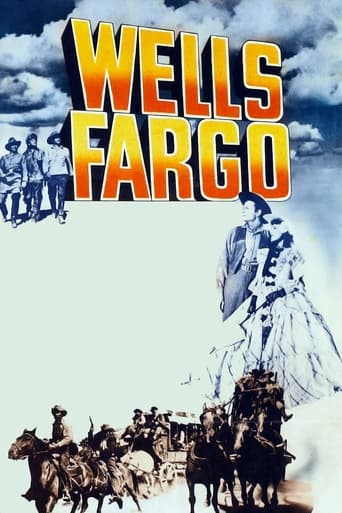

Such a frustrating disappointment
... View MoreGood story, Not enough for a whole film
... View MoreThis movie tries so hard to be funny, yet it falls flat every time. Just another example of recycled ideas repackaged with women in an attempt to appeal to a certain audience.
... View MoreAmazing worth wacthing. So good. Biased but well made with many good points.
... View MoreOne fictional Ramsay MacKay(Joel McCrea) begins with a local mail and package delivery service in upstate NY. Soon, he joins WF, which is about to expand it's stagecoach services west to St. Louis. Of course, it would soon initiate stage service between St. Louis and San Francisco, which MacKay was involved in. The film deals almost exclusively with the role of WF in transportation and mail, ignoring it's importance to banking, especially in CA. In fact, it was the major bank company in early CA. The film dramatizes the occasional attack of stagecoaches by Native Americans, who also burned down a station, killing all the people. Historically, this happened at least once, during the Paiute War of 1860, at Williams Station, NV. Also, an incident is dramatized in which a Confederate cavalry unit held up a stage, confiscating a large amount of gold, so that it wouldn't contribute to the Union war effort. I was unable to find information confirming that this actually happened. Actually, the great majority of gold and silver from CA-NV was transported by ship to the East. On the other hand, gold from Colorado and Montana probably was often sent south or east on stages. Of course, it wasn't long before railroads began to compete with stages for freight, mail and passengers. However, stages would continue for some years to service feeder routes to the railroads. .....Getting back to the story, Bob Burns makes his frequent appearance known by his distinctive voice and gab. He often serves to do odd jobs for MacKay, but doesn't play his bazooka, as he sometimes did in films. Near the end, he gives a rousing speech at a dinner about the accomplishments of WF....Francis Dee, soon to become Mrs. McCrea off the set, played MacKay's love interest, as Justine. He meets her in NY state, and later delivers a package to her home in St. Louis. They marry, but have disagreements about his time spent on the road, and working for a company that exclusively served the Union(her family being from the South). Eventually, they split, although not divorced. MacKay happens to arrive at Justine's house the day before the birthday for their 17y.o. daughter, who invites him to her party. He declines, saying he must leave immediately. However, he does show up, and suggests to Justine that they get back together......MacKay opens a WF office in San Francisco, and delivers mail out in the gold fields, returning with gold to keep in his safe for the miners.....A little bit is mentioned about competition in CA , and the eventual merger with Wells Fargo of several of their big competitors.....Paramount sank $1.5 million into this film, which was a tidy sum in those days. Don't know how it fared at the box office. See it on YouTube.
... View MoreThis film is a very fictionalized account of the early days of Wells Fargo---long before it metastasized into the gigantic mega-bank that charges innumerable service fees like it does today. However, instead of focusing on the big-wigs at the company, it focuses on a fictional man, Ramsay (Joel McCrea) and his many difficulties he had establishing banking, transportation and mail services in the wild west. It also focuses on his marriage--one that eventually became very rocky and problematic.The problem with this film is that it is extremely episodic--with giant jumps in time here and there. As a result, it comes off more like a Cliff Notes version of a story instead of a rich and complete on. Compacting the story much more would have helped immensely, as the characters come off as very stiff and distant to the audience. Not a bad film but one that really should have been a lot better considering the large budget and cast. More money should have been spent on the script and less on extras and sets.
... View MoreParamount with the production of Wells Fargo and The Plainsman started the return of westerns to the A picture list with big budgets. Though the Cecil B. DeMille production of The Plainsman is flashier and splashier, Wells Fargo under the direction of Frank Lloyd seems to have had more staying power. It certainly has the budget of a DeMille film and kind of hard to think that Adolph Zukor would have sprung for two big budget westerns in the same year. If they had flopped Paramount would have gone under.Frank Lloyd is a name all but forgotten by today's fans. Yet he had won two Academy Awards by the time Wells Fargo came out, for The Divine Lady in 1929 and for Cavalcade in 1933. And he had just missed winning a third the year before for his greatest film, Mutiny on the Bounty. He got good performances out of the whole cast.Stuart Lake wrote the script and he borrows from Edna Ferber's style of story telling. The action of the film covers a twenty five year period from the early 1840s to Reconstruction. Joel McCrea as Ramsey MacKay is an Edna Ferber like hero, a heroic man involved in a big enterprise who sacrifices a lot of personal happiness towards that end. Frances Dee, Mrs. McCrea in real life, is his loving if not always understanding wife, also in the Ferber tradition.The fictional Ramsey MacKay is an important part of the growing company of Wells Fargo. Henry O'Neill and Frank Clark, play the real life partners of John Wells and William Fargo, with Clarence Kolb as John Butterfield who later merges his stagecoach line with them.The only part of the film I found a bit ridiculous was the battle between McCrea who is taking a gold shipment east and the Confederates led by Johnny Mack Brown. Somehow I don't believe the desperate Confederacy towards the end of the war would have had Brown offer to parley with McCrea and give him a chance to surrender peacefully if the Confederates were outnumbered. Even with Brown being a friendly rival for Dee's hand earlier on, this was in fact war. When the shooting starts the battle is well staged.Paramount shot this one on location for the most part and the production values do show. Frank McGlyn played Abraham Lincoln in this film as he did in The Plainsman. Bob Burns who was a regular on Bing Crosby's Kraft Music Hall at the time and appeared in a few Paramount films with Bing plays the sidekick role here. Look for Bob Cummings in a small part as a young prospector.Wells Fargo is a well done epic western and in fact it's the film that really made Joel McCrea a western star.
... View MoreSince getting a channel exclusively devoted to Westerns, I've seen movies that are never seen on regular channels, like Wells Fargo.Joel McRea, whom I'd enjoyed immensely in These Three, is impressive in a Western. He's rugged and tough, but goes beyond the stereotype, and is sensitive and understanding. He ages from his 20's to his 60's believably. The story of courier service extending out west makes me want to read more about these pioneers of exploration.
... View More